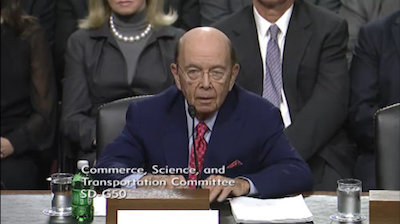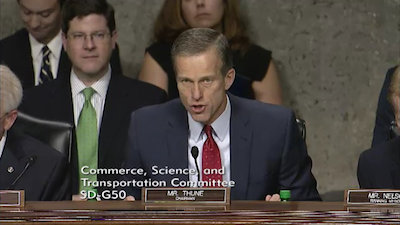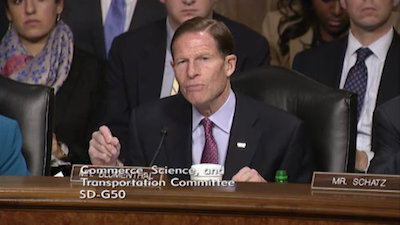
Wilbur Ross, Commerce Secretary Nominee, at his confirmation hearing.
On the morning of Wednesday, January 18th, the U.S. Senate Committee on Commerce, Science, & Transportation convened for a hearing to consider the nomination of Wilbur Ross to serve as the U.S. Secretary of Commerce in the cabinet selected by President-elect Donald Trump. The day’s discussion focused heavily upon the foreign trade policies which would be pursued by the Trump Administration, efforts toward improving domestic infrastructure and needs facing important industry sectors in the United States. The committee’s response to Ross’s nomination as the commerce secretary was warm enough that by the end of the hearing, Sen. Dan Sullivan (R-AK) remarked that he looked forward to Ross’s “swift confirmation.”

Senator John Thune (R-SD).
“I may be the only nominee ever for Secretary of Commerce who was a census taker,” remarked Ross early on in the proceedings, noting that he served as an enumerator in the Scollay Square neighborhood of Boston many years ago. Aside from that experience with a Department of Commerce agency, committee chairman Sen. John Thune (R-SD) noted Ross’s experience included service with the U.S. Army and his work in consolidating failing steel companies into International Steel Group back in 2002 as a highlight of Ross’s career as one of the world’s most influential people in global finance.
In his opening remarks, Ross noted that he had been a consumer of various forms of data published by various agencies within the commerce department. He seemed attuned to the importance of data collection and dissemination, noting that 40 percent of publicly disseminated data from all federal agencies comes from the Department of Commerce. With experience operating businesses in 23 countries, Ross was confident in his ability to negotiate foreign trade agreements to the benefit of the American economy. “I know directly what’s good and what’s not good about trade policies in other countries,” Ross said. He added that he was neither pro-trade nor anti-trade but rather pro-sensible trade, which he defined as being supportive of trade deals which were good for American workers and businesses.
Early in the hearing, Thune remarked that Ross would be much more involved in negotiating trade agreements within the Trump Administration, taking on a role which had traditionally been overseen by the U.S. Trade Representative. Ross maintained that while both himself and President-elect Trump had no intention of doing anything adverse to the trade representative’s Congressional mandate, it made good sense to bring all intellectual resources, including his own, to bear in solving trade issues. Ross added that the first logical trade target for the Trump Administration to address was the North American Free Trade Agreement (NAFTA). “We need to solidify relationships in the best way that we can in our own territory before we go off to other jurisdictions,” Ross said.
Once the Trump Administration addresses foreign trade policy in North America, it seems likely that its attention will turn to China, which Ross called “the most protectionist country of very large countries. They talk much more about free trade than they actually practice. We need to bring the realities a bit closer to the rhetoric.” One problem posed by China’s foreign trade practices included global overcapacity of steel, an issue to which China contributes by pouring 100 million tons of steel into the global market each year. Not only did the U.S. need to respond with stronger anti-dumping requirements but Ross argued that enforcement of those requirements had to be tougher. Ross said that he was “horrified” to learn that, after a multi-year trade case, countervailing duties which might reach billions of dollars would be impossible to collect from shell companies which operated to help foreign firms get around strict regulations in trade deals. “That kind of thing has to be fixed,” Ross said. He added that he was in favor of working “systematic reopeners” into the language of foreign trade agreements so that trade agreements could be reviewed after a few years. This would allow the U.S. to evaluate aspects of the agreements and address any unintended consequences.
The Trump Administration will focus on making bilateral trade agreements with foreign nations, according to Ross. Although there was nothing inherently wrong with multilateral agreements, bilateral agreements were quicker and easier to negotiate, and did not produce the complex environment which leads to less-than-reasonable results which often come from multilateral agreements. “If you negotiate with 12 different countries, the first one… says ‘Yes, we’ll give you a concession, but we want something back,’” Ross said. “The next country, they take a little nick. After 12 times, you get a lot of nicks. Other countries get the benefit of things they didn’t even ask for.” Regarding the Trans-Pacific Partnership (TPP), Ross said that while he was initially favorable towards the trade agreement, he found many aspects of the deal were not consistent with how the agreement was advertised after delving into the document.

Senator Richard Blumenthal (D-CT).
Readers who might be hoping that there was any mention of U.S. patent policy, which falls under the umbrella of the Department of Commerce, would be disappointed as there were very few mentions of anything related to our nation’s system of intellectual property protection. Ross did note the need for more research and development and more encourage of technological breakthrough to improve the prospects for American exports. The only time time the U.S. Patent and Trademark Office was mentioned, however, was when Sen. Richard Blumenthal (D-CT) asked Ross whether trademark applications filed by Trump was a potential conflict of interest which could result in the President-elect benefitting from a federal agency while serving as President. In fact, there were multiple times during the hearing during which Ross was asked whether he felt Trump should have divested himself of all of his business interests in the way that Ross himself did. Ross said he believed that the rules requiring him to divest his own business interests as a nominee in front of the U.S. Senate were different than the rules regarding the business interests of a sitting President and declined to pass judgement on Trump’s decision.
Ross’s own ethics were the subject of some appreciation among members from both sides of the political aisle. Sen. Bill Nelson (D-FL), the ranking Democrat on the Senate commerce committee, remarked that Ross was very forthcoming about pertinent personal and business information leading up to the hearing, including the recent firing of a household employee hired in 2009 who was unable to produce appropriate citizen or immigration records, which Ross checked after his nomination to the commerce secretary position.
Infrastructure policy was another topic of discussion during the hearing and a subject of focus for Ross, who had previously penned a report on Trump’s infrastructure plan with fellow Trump advisor Peter Navarro released in late October. During his nomination hearing, Ross argued that pursuing infrastructure projects helps the economy by both creating jobs and updating “archaic” transportation systems which were a drain on the economy. The low interest rate environment put in place by the Federal Reserve provided a unique opportunity to address infrastructure, according to Ross. “If it were a high interest rate environment, the problem would be two or three times harder to solve,” he said. Along with roads, railways and bridges, Ross was clear that he felt that the buildout of broadband in communities across the country, including rural ones, was an “essential part” of infrastructure plans and overall economic policy. “It is to a very large degree a path to the future,” Ross said. A sensible infrastructure program was one of four major economic policy planks that would take shape in a Trump Administration with Ross serving as commerce secretary, the other three planks being regulatory reform with a focus on cost-benefit analysis, an energy policy which uses natural resources to reduce dependence on foreign energy sources and reductions to the nation’s corporate tax rate.
Commerce’s oversight of the domestic fishing industry, of which Ross said he only recently realized the complexities, was another topic dear to the hearts of many Senators on the commerce committee. Ross was interested in turning the United States into a net exporter of fish, correcting the current $11 billion trade deficit the nation faces in this industry. The topic was of great interest to Sullivan, who noted that more Alaskans were employed in fishing than in the oil & gas industry and that 60 percent of all seafood harvested in the United States came from Alaska’s waters. Blumenthal asked Ross to commit to looking at an issue involving the unauthorized flow of fish stock from Mid-Atlantic to New England states. Sen. Maggie Hassan (D-NH) also spoke to issues specific to her state, where the fishing industry was exclusively composed of small boat fishermen who are greatly impacted by fee structure changes.
The weather forecasting functions of the National Oceanic and Atmospheric Administration (NOAA) was another important topic of discussion during the day’s hearing. Nelson asked Ross to commit to upholding NOAA’s scientific integrity policy which prevents anyone from suppressing a scientist who wants to share research with the public. “I support the dissemination of valid information to the public,” Ross said. “I don’t think that valid information should be sealed.” Ross added that he had a good deal of respect for NOAA, an agency whose scientific staff includes four Nobel Prize winners. Sen. Brian Schatz (D-HI) noted that, although NOAA’s $6 billion budget during 2016 was 60 percent of the commerce department’s total expenditures, funding for the agency has stagnated in recent years, hurting its data collection and weather modeling capabilities. “The data that NOAA gathers in the Pacific… is essential for forecasting impacts around the country,” Schatz said. Although Nelson and other committee members noted the importance of NOAA’s weather data collection for coastal communities, especially within the context of climate change, Sen. Shelley Moore Capito (R-WV) noted that NOAA has a large presence in the inland state of West Virginia, specifically in the form of a facility that serves as a consolidated primary backup for NOAA operations. “It’s probably an earmark from Robert C. Byrd,” Capito quipped, referencing the longtime Senator from West Virginia who passed in 2010.

![[IPWatchdog Logo]](https://ipwatchdog.com/wp-content/themes/IPWatchdog%20-%202023/assets/images/temp/logo-small@2x.png)

![[[Advertisement]]](https://ipwatchdog.com/wp-content/uploads/2023/01/2021-Patent-Practice-on-Demand-1.png)
![[Advertisement]](https://ipwatchdog.com/wp-content/uploads/2024/04/UnitedLex-May-2-2024-sidebar-700x500-1.jpg)
![[Advertisement]](https://ipwatchdog.com/wp-content/uploads/2024/04/Artificial-Intelligence-2024-REPLAY-sidebar-700x500-corrected.jpg)
![[Advertisement]](https://ipwatchdog.com/wp-content/uploads/2024/04/Patent-Litigation-Masters-2024-sidebar-700x500-1.jpg)

![[Advertisement]](https://ipwatchdog.com/wp-content/uploads/2021/12/WEBINAR-336-x-280-px.png)
![[Advertisement]](https://ipwatchdog.com/wp-content/uploads/2021/12/2021-Patent-Practice-on-Demand-recorded-Feb-2021-336-x-280.jpg)
![[Advertisement]](https://ipwatchdog.com/wp-content/uploads/2021/12/Ad-4-The-Invent-Patent-System™.png)






Join the Discussion
One comment so far.
Greg Hopper
January 25, 2017 01:24 amI’ll be interested in seeing what he does with the International Trade Admin, Economic Dev Admin, Minority Business Dev Agency, Hollings Mfg Ext Partnership and the Advanced Mfg Tech Consortia.